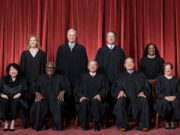Ilya Shapiro
Ilya Shapiro is a senior fellow and director of constitutional studies at the Manhattan Institute. Previously he was executive director and senior lecturer at the Georgetown Center for the Constitution, and before that a vice president of the Cato Institute, director of Cato’s Robert A. Levy Center for Constitutional Studies, and publisher of the Cato Supreme Court Review.
Shapiro is the author of Supreme Disorder: Judicial Nominations and the Politics of America’s Highest Court (2020), coauthor of Religious Liberties for Corporations? Hobby Lobby, the Affordable Care Act, and the Constitution (2014), and editor of 11 volumes of the Cato Supreme Court Review (2008-18). He has contributed to a variety of academic, popular, and professional publications, including the Wall Street Journal, the Harvard Journal of Law & Public Policy, Washington Post, Los Angeles Times, USA Today, National Review, and Newsweek. He also regularly provides commentary for various media outlets and once appeared on the Colbert Report.
Video: Lawless – The Miseducation of America’s Elites
In his new book, “Lawless: The Miseducation of America’s Elites,” Manhattan Institute Senior Fellow Ilya Shapiro shows how US higher education has been transformed away from a place where students learn how to think critically, make cogent arguments and respect viewpoints that are different from their own. Today, however, those schools are more like […]
Ban Masking Now
Early in the afternoon on New Year’s Eve, a man was violently thrown in front of an oncoming subway train in Manhattan. According to Ritchie Torres, a Democratic congressman from the Bronx with his eyes on higher office, the alleged perpetrator was—unsurprisingly—wearing a mask. “Wearing a mask for the purpose of committing crimes against innocent […]
Video: The Supreme Court – 2024 Decisions and their Impact
Parts of our media and political leadership have been working hard to distract the public on the issue of the Supreme Court, asking, “Do we need a Supreme Court? Maybe the world is different now and the old job of the Court is no longer relevant.” “If we have to have it, can it be […]





